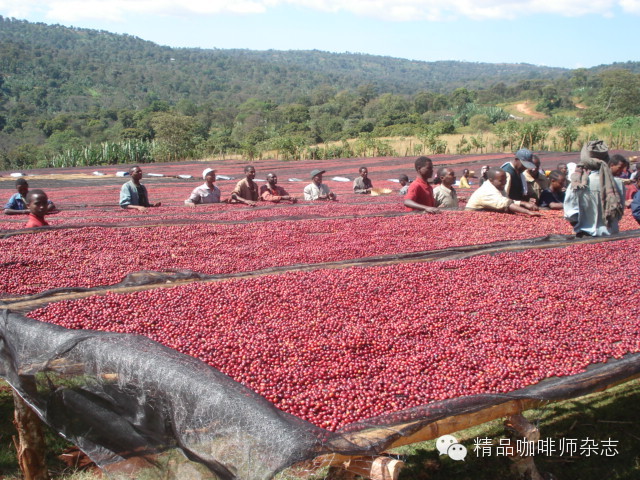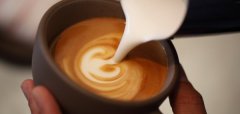Kenyan boutique coffee coffee producing area
The best way to harvest high-quality coffee beans is to harvest them manually. That is, only mature coffee fruits are picked to prevent coffee fruits with inconsistent maturity from being picked at the same time. Because those unripe and overripe fruits will affect the balance and stability of coffee taste, boutique coffee needs to be picked frequently and carefully during harvest.
People in the coffee industry all think that Kenyan coffee is one of its favorite products, because Kenyan coffee contains every feeling we want from a good cup of coffee. It has wonderful and satisfying aromas, well-balanced acidity, well-proportioned particles and excellent fruit flavors.
Coffee entered Kenya in the 19th century, when Ethiopian coffee drinks were imported into Kenya through southern Yemen. But it was not until the early 20th century that the Bourbon Coffee Tree was created by the St. Austen Mission (St). Austin Mission) is introduced.
Kenyan coffee is mostly grown at an altitude of 1500 to 2100 meters and is harvested twice a year. To ensure that only ripe berries are picked, people must tour the forest about seven times. Kenyan coffee is grown by small farmers. After they harvest the coffee, they first send the fresh coffee beans to the cooperative cleaning station. The washing station sends the dried coffee to the cooperative in the form of "parchment coffee beans" (that is, coffee beans covered with endocarp) to the cooperative ("parchment coffee beans" is the last state of coffee beans before peeling). All the coffees are collected together, and growers charge an average price according to their actual quality. This trading method generally works well and is fair to both growers and consumers.
The Kenyan government takes the coffee industry very seriously, where it is illegal to cut down or destroy coffee trees. The buyers of Kenyan coffee are world-class buyers of quality coffee, and no country can grow, produce and sell coffee continuously like Kenya. All coffee beans are first acquired by the CBK (coffee Board of Kaeya), where they are identified, rated, and then sold at weekly auctions, where they are no longer graded. Kenya Coffee Council only acts as an agent, collecting coffee samples and distributing them to buyers so that they can determine the price and quality. The auction in Nairobi is for private exporters, and the Kenya Coffee Commission pays growers less than the market price. the best coffee is bean-shaped berry coffee (PB), followed by AA++, AA+, AA, AB and so on. Good coffee is shiny, delicious and slightly alcoholic.
Auctions are also organized to meet the needs of dispatchers. This kind of auction usually has a small auction volume (3-6 tons each), with samples with the grower's logo for buyers to enjoy. After the auction, the exporters pack according to different flavors, different qualities and the quantity required by the blenders. This provides a great deal of flexibility for the dispatcher. Quality-conscious Germans and Scandinavians are long-term buyers of Kenyan coffee.
Internationally, the increase in the number of Kenyan coffee is obvious. From 1969 to 1970, 800000 bags were exported, and from 1985 to 1986, exports increased to 2 million bags. Now the yield is stable at 1.6 million bags, with an average yield of about 650kg per hectare.
Even before coffee prices skyrocketed in recent years, the average price of coffee in Kenya had been rising. Prices from 1993 to 1994 were 50% higher than they were 12 months ago. The rise in prices is mainly the result of increased demand.
Some buyers, especially Japanese businessmen, have expressed dissatisfaction with the Kenyan coffee industry system. Some businessmen say that the quality of coffee in the country has declined, and point out that buying directly from farmers may be a way to improve the quality. But in any case, Kenya's detailed rules and regulations and sound procedures are a model for all coffee-producing countries.
Kenyan Coffee became more famous with the sensation of the Hollywood movie Out of Africa. In the film, Meryl Streep (Maryl Streep) plays the heroine Karen, a writer and coffee plantation owner. Many people may still remember the beautiful scenery and the magnificent sunset in the film, but what is even more unforgettable is Karen's dream of having a coffee plantation in Africa.

Important Notice :
前街咖啡 FrontStreet Coffee has moved to new addredd:
FrontStreet Coffee Address: 315,Donghua East Road,GuangZhou
Tel:020 38364473
- Prev

Never drink coffee with it.
Eating coffee and alcohol together can kill myocarditis and the theophylline and caffeine contained in strong tea and coffee have similar effects on the heart, that is, increasing heart rate and myocardial contractility, resulting in an increase in myocardial oxygen consumption. In addition, theophylline and caffeine stimulate the brain, causing restlessness, excitement and insomnia. This not only hinders the quiet rest and recuperation of patients with myocarditis
- Next

Multi-coffee brands compete for the Chinese market, Starbucks faces challenges
Starbucks (Starbucks) is the name of an American coffee chain, founded in 1971, is the world's largest coffee chain, its headquarters is located in Seattle, Washington, USA. Starbucks' retail products include more than 30 of the world's top coffee beans, hand-made espresso and a variety of hot and cold coffee drinks, fresh and delicious pastries, and a variety of coffee.
Related
- What is the difference between Indonesian Sumatra Mantinin coffee and gold Mantinin? How to distinguish between real and fake golden Mantelin coffee?
- What does bypass mean in coffee? Why can hand-brewed coffee and water make it better?
- Unexpected! Ruixing Telunsu lattes use a smoothie machine to foam milk?!
- % Arabia's first store in Henan opens into the village?! Netizen: Thought it was P's
- Does an authentic standard mocha coffee recipe use chocolate sauce or powder? Mocha Latte/Dirty Coffee/Salty Mocha Coffee Recipe Share!
- What is the difference between Vietnam egg coffee and Norway egg coffee? Hand-brewed single product coffee filter paper filter cloth filter flat solution!
- What is the difference between sun-cured and honey-treated coffee? What are the differences in the flavor characteristics of sun-honey coffee?
- How to make Italian latte! How much milk does a standard latte use/what should the ratio of coffee to milk be?
- How to make butter American/butter latte/butter Dirty coffee? Is hand-brewed coffee good with butter?
- Is Dirty the cold version of Australian White? What is the difference between dirty coffee/decent coffee and Australian white espresso?

